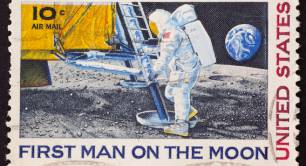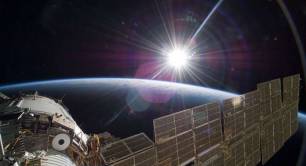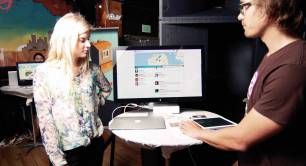Space gaming is seriously boosting cancer research
The internet is making it easier for individuals to help tackle societal problems. From measuring radiation levels near the Fukushima nuclear plant in Japan to helping to co-ordinate disaster relief in Haiti.
UK innovation foundation Nesta is working with the European Commission to map where, why and how technology is being used in this way across Europe. One of the nearly 800 organisations plotted so far - Cancer Research UK - explains why enlisting citizen scientists online is helping to tackle one of the UK’s primary health issues.
Citizen Science at Cancer Research UK is a world-leading, innovative approach that uses digital social innovation to support our core purpose: to bring forward the day when all cancers are cured.
The programme is a unique collaboration between technology experts, developers and scientists to produce online ‘games’ through which the public can analyse real cancer data.
Big data battles
Big data is a term we hear about in lots of industries – from IT and marketing and even personal health. But it’s also impacting cancer research.
With increasingly powerful technologies available to look at patients’ cancer samples, scientists are faced with masses of new information about each individual patient. Information when looked at for thousands of patients could hold clues to new and kinder cancer treatments.
We knew our scientists were drowning in huge amounts of data – they couldn’t analyse it as quickly as they’d like. The most effective tool for analysing cancer data is often the human eye as computers simply aren’t good enough at understanding patterns or spotting things that look a bit unusual. This means it can take scientists years to look over the huge volumes of data they need to analyse, which delays the search for new cancer treatments.
To speed up the analysis, we realised we needed more people to help spot the patterns we’re after. We recognised that we didn’t need people with PhDs or lab coats to look at the data. We needed an army of people who could battle through the data and tell our scientists what they saw.
The question was, how could we bring cancer analysis to the masses?
Digital social innovation we learnt from
Inspired by the success of projects like Planet Hunters, where the public is asked to help discover new planets, we were interested in the opportunity of crowd-sourced science to help accelerate cancer research.
At the heart of projects like this were two main things: the power of people and technology.
With Planet Hunters and other projects on The Zooniverse, hundreds of thousands of people came together to look at previously unseen images of the universe and were asked to classify what they saw. The technology behind the projects means that anyone from across the globe can access the platform and millions of results can be analysed and given to the scientists looking at the findings.
The opportunity struck us as an obvious one. Digital social innovation had made crowd-sourced science possible for other areas of research, so why couldn’t it work for cancer research?
DSI and cancer research
Our first venture, Cell Slider, is the world’s first online platform which transforms real cancer data into an engaging format so it can be analysed by anyone. Users are shown tumour tissue samples, and asked to analyse them in the same way our experts do – by using their eyes. By examining and spotting cancerous cells, citizen scientists from all over the world can help us understand how well a patient will respond to different treatments.
In just 3 months the general public used Cell Slider to analyse data which had taken scientists 18 months and produced results of comparable accuracy to our scientists.
For our next game, we looked to the massive trend in mobile gaming as an opportunity to get even more eyes on our data.
Play to Cure: Genes in Space is the world’s first mobile app that incorporates the analysis of genomics data into an action-packed mobile game. As players fly through space tracing and collecting a fictional substance dubbed Element Alpha, they’re helping us to analyse data and find critical clues about the genetic mistakes which underpin cancer.
Within a month, Genes in Space users had made 1.5 million classifications, which would have taken a research team six months to do.
The future
Our ‘games’ have been played in almost every country in the world and have proved that digital social innovation will continue to be at the heart of future citizen science products.
But this is just the start for us. We have just launched a new mobile puzzle game, Reverse The Odds, in partnership with Channel 4 and have another product in the pipeline for later this year.
We’re also working closely with our researchers to prove that analysis carried out using our products is scientifically robust and genuinely useful. This is absolutely crucial – we want researchers to see Citizen Science analysis as a recognised and reliable research method.
It’s not often you see scientists working hand in hand with game developers or see leading technology giants wanting to find innovative ways to help with front line science problems. Our advice to others businesses would be to understand what’s really slowing you down and stopping you from making progress. You’ll be surprised at how digital social innovation could revolutionise how you think about these problems.
Learn more about digital social innovation and map your own project at www.digitalsocial.eu



